- Home
- Lauren Willig
The Mark of the Midnight Manzanilla Page 2
The Mark of the Midnight Manzanilla Read online
Page 2
Nine out of ten dentists notwithstanding.
Megan checked her watch and grimaced. “Twelve forty-five,” she said.
It was our fifteen-minute warning. Tutorial started at one. Office space being scarce, especially for the junior of the junior, we both taught our tutorials in the café at the Barker Center, the vast redbrick building that housed the English department.
I was a little jealous. The history department didn’t have a café. We just had a black plastic coffeemaker that no one ever remembered to clean.
“At least we’re in your territory today,” I said, heaving my black leather satchel up on my shoulder.
In honor of Halloween, we had joined forces. We were teaching Le Fanu’s Carmilla, and, of course, Bram Stoker’s Dracula. With particular reference to gender politics and class considerations. This was Hist and Lit, after all. If you couldn’t work the term “liminal” into your tutorial, you were doing it wrong.
Megan made the sort of face I make when people assume I’m a Victorianist. “Not really . . . People have already worked Carmilla and Dracula to death. I’m looking at the antecedent narratives. Earlier references to vampires in popular fiction,” she translated.
Lit people tend to assume that Hist people are a little slow. From their point of view, we’re practically social scientists, and everyone knows what those social scientists are like.
“Yep, understood,” I said. “So, like, what?”
Most of the works she mentioned were completely unknown to me. I let the catalogue of names wash over me as I crumpled my napkin onto my paper plate. I was trying to determine whether there was enough Coke left in my cup to justify taking it with me when I heard Megan say, “Then there’s The Convent of Orsino. . . .”
The name acted on me like an electric shock. I nearly dropped my waxed-paper cup. “You’re writing about The Convent of Orsino?”
Megan stopped with her own straw halfway to her lips. “You’ve heard about The Convent of Orsino?”
Had I heard of The Convent of Orsino?
It was a long and rather improbable story, involving family feuds and lost jewels, so I decided to boil it down to essentials. “The author was one of Colin’s ancestors. Ancestresses. Whatever.” I couldn’t resist bragging a bit. “There’s a great big ornate first edition at Selwick Hall.”
Megan choked on the dregs of her Diet Coke. “I can’t believe you actually got to hold a first edition of The Convent of Orsino.”
“Phrases that don’t come up often . . . ,” I murmured.
“This is great! You can help me out. I mean, Colin can help me out.” Common sense tempered academic fervor. Megan shot me a sheepish glance. “If that’s okay with you. I don’t want to monopolize your Colin time.”
“It depends on what you want him for,” I said cheerfully.
Colin was supposed to be in town for four days—a very short time by some reckonings, a very long time by others. I hadn’t known what to plan or not plan. In England, our days had simply meandered peacefully along: Colin had worked on the spy novel he was convinced would make him the next Ian Fleming, I had worked on my dissertation, and in the evenings we had watched silly movies or headed out to the Heavy Hart, ye olde local pub (trivia night on Tuesdays, chicken tikka on Thursdays).
Now that he was coming to my turf, I wasn’t quite sure how we were meant to fill twenty-four hours a day.
Today was Thursday. Sunday was Halloween, and, incidentally, my birthday eve. I was an All Souls’ Day baby, which was technically the reason for Colin’s visit. We were also just a few weeks shy of our one-year anniversary. Colin had been hinting for several phone calls now at a “special surprise.” I veered between expecting a proposal and a pair of thermal socks.
All right, maybe not the thermal socks (although they would be useful if I returned to Selwick Hall for the winter holiday), but I was trying not to get my hopes up, and thermal socks were the least romantic thing I could think of. Naturally, the more I told myself “thermal socks,” the more I secretly convinced myself that Colin was going to show up with the Ancestral Ring of the Selwicks, prostrate himself on my none-too-clean floor, and beg for the honor of my hand.
Or something along those general lines.
There were a number of flaws to this fantasy. Among other things, if there ever had been an Ancestral Ring, I was reasonably sure Colin’s mother would long since have traded it in for something sleek and trendy.
In an attempt at sanity, I said, “I’m sure we can make time for a coffee. What do you want to pick his brains about?”
“Anything he can tell me about this ancestor of his,” said Megan, dodging a group of tourists who appeared to have meant to go to Au Bon Pain next door and were looking in vain for a connecting door.
“That’s more my province than Colin’s. What about her?”
Mrs. William Reid, née Miss Gwendolyn Meadows, had been the second-in-command of the Pink Carnation from 1803 through 1805. And I wasn’t entirely convinced that their connection had ended with her marriage. That was part of what I intended to find out. If I could figure out how. The paper trail had dead-ended on me and I hadn’t quite determined which tack to take next.
“Well . . .” Megan fingered her beads, the same way she did when trying to figure out how to explain a text to a group of undergrads. “Basically, what I’m looking at are the intersections between fact and fiction in early vampire narratives. Of course,” she added hastily, “we all know that the vampire myth is merely a metaphor for sexual repression and inchoate class conflicts.”
“Yup,” I said, nodding encouragingly. “But . . .”
Reassured, Megan went on. “But there’s a chicken-and-egg factor. You get vampire scares that lead to myths that lead to scares that lead to myths. Many of them predating Dracula by a fair amount.”
Without having to consult, we detoured into Toscanini’s for preclass coffees. The coffee in the Barker Center was of the college cafeteria variety, for emergency use only. “Where does The Convent of Orsino come into this? I’ll have a large Vietnamese coffee, please.”
“And I’ll have a skim latte.” Megan rooted in her wallet for cash, dropping an extra dollar in the tip jar. “I’d thought The Convent of Orsino was a perfect example of an antecedent event transmuted into a fictionalized narrative in a way that reified class and gender concerns.”
My head was spinning a bit, so I seized on the easiest piece. “What antecedent event are you talking about?”
I’d spent a fair amount of time with The Convent of Orsino, and as far as I could tell, it was all fiction.
Well, mostly.
The book followed the exploits of Plumeria, the dashing chaperone, who teamed up with the aging-but-still-got-it Sir Magnifico to rescue Magnifico’s insipid daughter, Amarantha, from the clutches of the sinister but attractive Knight of the Silver Tower, aka the vampire. I was pretty sure that Plumeria was a thinly veiled alter ego for Miss Gwen, and I strongly suspected that the Knight of the Silver Tower was the French spymaster the Chevalier de la Tour d’Argent—who, by the way, was not, as far as I could tell, any kind of undead. He had, however, committed the cardinal sin of pissing off Miss Gwen, and was therefore condemned to roam the ranks of vampire fiction for eternity as a spoony, moony, self-loathing creature of the night. In sparkly armor.
“That’s just the problem,” said Megan mournfully. “It turns out it’s the other way around. The book came first. And it was so perfect.”
I took a long, bracing swig of my coffee, so strong that it made Starbucks taste like a distant second cousin to caffeine. “What was?”
Outside, the air was crisp and bracing, perfect jacket weather. We picked up our pace in an attempt to get to the Barker Center before our students did. There’s always a little loss of moral high ground when the TF is five minutes late. And, trust me, we needed all the moral high ground
we could get.
Breathlessly, Megan said, “There was a vampire scare in London—including a woman turning up dead with fang marks on her neck—and the author of The Convent of Orsino was all over it—but it looks like it happened after her book, not before.”
“Whoa.” Miss Gwen and vampires? I stumbled as my heel caught on a bit of uneven brickwork and just managed not to upend my coffee over my cream-colored sweater. “All over it how?”
I was amused by the idea of Miss Gwen as a sort of parasol-toting Van Helsing, but I couldn’t help but wonder if there might be something more to it. Whenever people turned up dead around Miss Gwen, they tended to be connected in some way or another to French spy rings. The Convent of Orsino came out in 1806. If my hunch was right, then maybe the dissolution of her partnership with the Pink Carnation was exactly what I had expected it was, a front.
It would make a brilliant chapter. If it were true.
“There was this duke—,” Megan began, and broke off as one of our students chugged up to us.
“Eloise? Megan?” She had the expression of contrition down pat. “I’m, like, SO sorry. . . .”
And it began.
“Don’t worry,” Megan was saying patiently. She gave me a shoot-me-now look over the girl’s head. “I’m sure you can find some way to make up the work.”
Grrr. The hands of the clock in the hall of the Barker Center clicked to one. Vampires were going to have to wait. And in three hours, my boyfriend was getting off a plane from England.
I thought of all the things I had intended to do before Colin arrived: shower, laundry, shove miscellaneous overdue library books into a coherent pile, go through the fridge to remove evidence of microwave dinners for one, buy fresh flowers to put into a vase (which led to the next item: buy a vase into which to put fresh flowers). Oh, yes, and bake cookies. Because, as we all know from Clueless, it’s important to have something baking.
Then I thought about Miss Gwen and vampires.
If I left directly after tutorial and hightailed it home, I would have time for at least the shower and quite possibly the library books. After all, any information Megan might have about Miss Gwen’s escapades in 1806 was already two hundred years old. It would keep for the weekend. It had been three long months since I had seen Colin. Surely, he deserved a little more consideration—and possibly, some fresh flowers—than a batch of long-dead spies?
I caught up to Megan as we joined the students jostling their way into the café of the Barker Center.
I couldn’t believe I was doing this, but . . .
“Do you have time for a very quick drink after tutorial?” I murmured. “I want to hear more about your vampire . . .”
Chapter One
London, 1806
“They say he’s a vampire.”
Sally Fitzhugh’s friend Agnes trotted after her as Sally made a beeline for the French doors to the garden, driven by a restlessness she couldn’t entirely explain. Behind her, she could hear the scraping of the musicians, the swish of fashionable fans. She just wanted out. Away from the heat, away from the smells, away from the petty gossip and murmurings.
It was October, and cold, but the ballroom was humid with the press of too many bodies in too small a place. The very mirrors seemed fogged with it, blurred and distorted. Even with her arms and neck bare, Sally felt uncomfortably warm in her silk and gauze gown.
The crisp October air hit Sally like a tonic, and, with it, Agnes’s words. Had Agnes really said—
“A what?”
Agnes ducked the rapidly swinging door. “A bloodsucking creature of the night,” she said helpfully as she followed Sally out towards the balustrade, away from the crush in Lord Vaughn’s ballroom.
“I know what a vampire is. Everyone knows what they are.” Ever since The Convent of Orsino (by a Lady) had taken the town by storm the previous spring, the ladies of the ton had become intimate experts on the topic. The men, just as sickeningly, had taken to powdering their faces pale and affecting red lip rouge. Sally found it distinctly ridiculous.
But, then, she was finding it all a little ridiculous just now: the too strong perfumes, the smug smiles, the whispering voices behind fans, the incredible arrogance of those powdered fops and perspiring ladies. It would serve them right if there were vampires in their midst. Not that such things existed, of course. Any bloodsucking that went on in the ton was purely of the metaphorical variety, although none the less draining for that.
Sally gripped the cool stone of the balustrade with both hands, breathing in deeply through her nose. She wasn’t sure what ailed her. Back in the cloistered confines of Miss Climpson’s Select Seminary, she had been itching to try her wings on the world, to flirt and laugh and bend beaux to her will. She knew exactly what it would be like: a cross between a Samuel Richardson novel and those notices one read in the paper, the ones that began with “Lady A— wore a gown of watered green silk.” She would be the toast of London, taking the town by storm.
And why shouldn’t she? She was, she knew, without false modesty, more than passably attractive. Quite a bit more, really. It didn’t do to be disingenuous about such things. So what if Martin Frobisher called her a gilded beanpole? He was just sore because she made him look like the sniveling little thing he was—and jealous because his family hadn’t two guineas to rub together. Proud, he called her. Well, yes, she was proud. She knew her own worth, both in character and in coin. What did it matter that her family had never thrown down a cloak for Elizabeth I or provided a mistress for Charles II? Just because they had never toadied for a title didn’t mean that they weren’t as good as anyone. They were certainly a sure sight better-looking, and her dowry was as big as anyone’s.
Both of those, Sally knew, guaranteed her entrée into society—or her brother’s name wasn’t Turnip.
She had sallied off to London in the firm anticipation of champagne-filled evenings of compliments, in which she would hold court among her devoted and witty admirers.
Well, she had been right about the champagne, at least. She just hadn’t expected it to taste quite so sour.
Even so, it was better than ratafia, the drink of young ladies, of which she had imbibed enough over the past year and a half to float a medium-sized royal barge. To be honest, she hadn’t minded the ratafia at the first. And if her admirers were less witty and more waspish—well, she was too busy flirting her fan and enjoying her own wit to mind. It was only bit by bit, along the course of her first Season, that she began to realize that it all felt a little flat. The bright silks and satins looked best by candlelight, where the stains didn’t show. The glittering jewels were too often paste. The fashionable gossip, which had seemed so terribly clever and scandalous in that first month, became nothing more than the endless repetition of a series of painfully similar on dits.
Did it really matter that Lucy Ponsonby had been seen without her gloves at Lady Beaufeatheringstone’s latest ball? It was hardly a matter of international policy.
She was just in a mood, she told herself. Tired, cranky, weary. Too many nights of too many entertainments that weren’t all that entertaining. It would get better. It had to get better. She didn’t like feeling like this, so purposeless. So restless.
She had hoped that having her friends Lizzy and Agnes join her this year would help, that introducing them to society would provide some of the vim that she had felt last year, when it was all fresh and new. But Agnes didn’t care much for such things, and Lizzy had rapidly, without much help from Sally, acquired her own circle.
Lizzy had, in fact, become something of a minor sensation in her own right. Part of it was due to her stepmother, Mrs. Reid. Mrs. Reid’s novel, The Convent of Orsino, was the topic of conversation at all select soirees, her presence a coup for any hostess. People fought to send cards to her stepdaughter, in the hope that Mrs. Reid might attend, and—even better!—lose her temper and pi
nk someone with her infamous sword parasol. A wound from Mrs. Reid was a sure sign of social success. But while Mrs. Reid’s notoriety might have garnered Lizzy the invitations, the rest she had achieved on her own. At any party, one could find Lizzy surrounded by a fascinated group of men and women, telling hair-raising tales of her youth in India. Given that Lizzy had left India at the age of six, and spent the rest of her formative years first with a retired vicar’s wife and then in the decidedly unexotic confines of Miss Climpson’s Select Seminary, Sally strongly suspected that the larger part of those stories were apocryphal, taken right out of the novels they had smuggled under the covers at Miss Climpson’s. Not that that made any difference to her audience.
It didn’t hurt that the rumor had made its way around the ton that Lizzy’s mother had been an Indian princess, complete with elephant and priceless jewels.
It was Sally who had started the rumor about Lizzy’s mother being an Indian princess. Not the elephants. The elephants had come later, along with other embellishments that made the originator of the tale raise her brows and wrinkle her nose. People did come up with the most ridiculous things. . . .
But, still, it was all better than the truth, which was that Lizzy’s mother had been a bazaar girl. A touch of royal blood rendered Lizzy interesting and exotic; without it, she would be stigmatized as nothing but the bastard brat of an insignificant East India Company Colonel of little fortune and no birth. That was what Sally had reckoned when she started the rumor.
Of course, she hadn’t reckoned on it running away from her like that.
She hadn’t reckoned on being left behind.
That was silly. It wasn’t as though Lizzy had left her. They still spent a great deal of time together. It was just . . . When Sally had left Miss Climpson’s for London, it had never occurred to her that Agnes and Lizzy would carry on without her, turning their trio into a duo. They had even had an adventure of their own—not that it was terribly much of an adventure, given that Lizzy and Agnes had run off the moment there was a hint of a French spy on the scene, disappearing for weeks and causing everyone a lot of bother finding them again. If Sally had been there, they would have routed the spy on their own, and saved everyone a great deal of trouble.

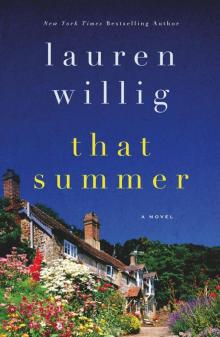 That Summer
That Summer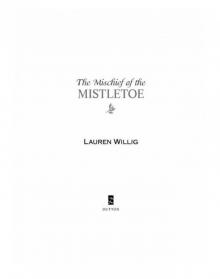 The Mischief of the Mistletoe
The Mischief of the Mistletoe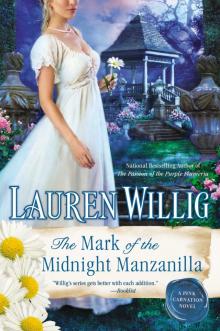 The Mark of the Midnight Manzanilla
The Mark of the Midnight Manzanilla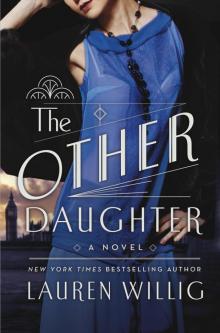 The Other Daughter
The Other Daughter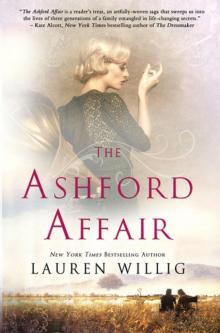 The Ashford Affair
The Ashford Affair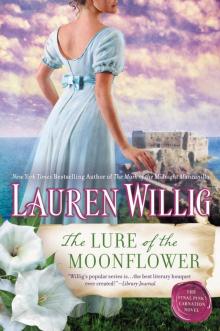 The Lure of the Moonflower
The Lure of the Moonflower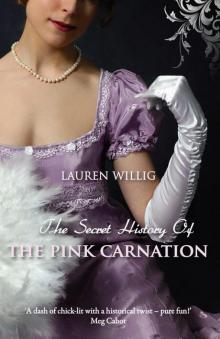 The Secret History of the Pink Carnation
The Secret History of the Pink Carnation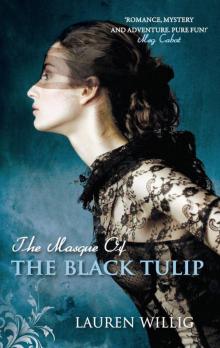 The Masque of the Black Tulip
The Masque of the Black Tulip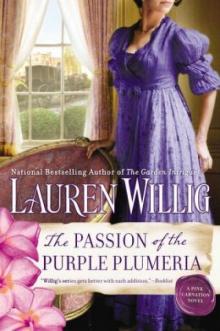 The Passion of the Purple Plumeria
The Passion of the Purple Plumeria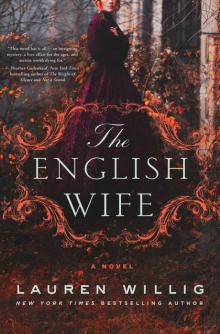 The English Wife
The English Wife The Garden Intrigue
The Garden Intrigue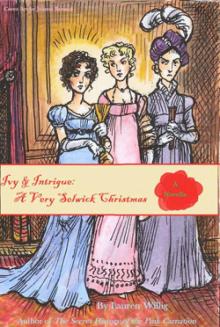 Ivy and Intrigue: A Very Selwick Christmas
Ivy and Intrigue: A Very Selwick Christmas The Orchid Affair
The Orchid Affair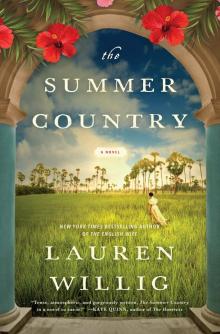 The Summer Country
The Summer Country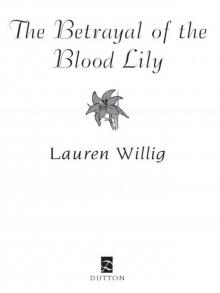 The Betrayal of the Blood Lily
The Betrayal of the Blood Lily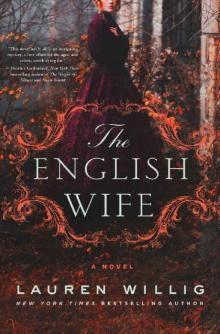 The English Wife: A Novel
The English Wife: A Novel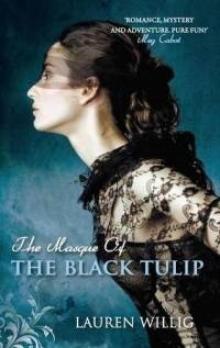 Masque of the Black Tulip pc-2
Masque of the Black Tulip pc-2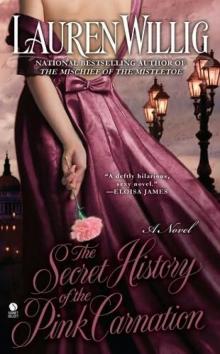 The Secret History of the Pink Carnation pc-1
The Secret History of the Pink Carnation pc-1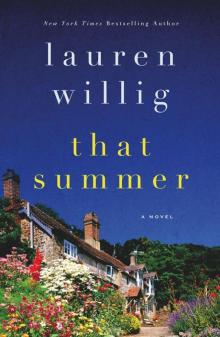 That Summer: A Novel
That Summer: A Novel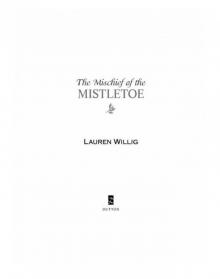 The Mischief of the Mistletoe: A Pink Carnation Christmas
The Mischief of the Mistletoe: A Pink Carnation Christmas